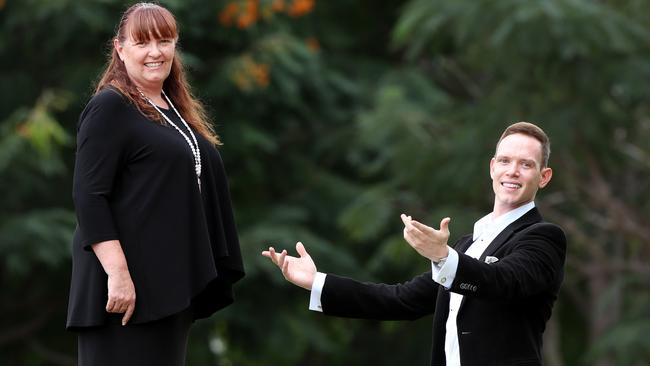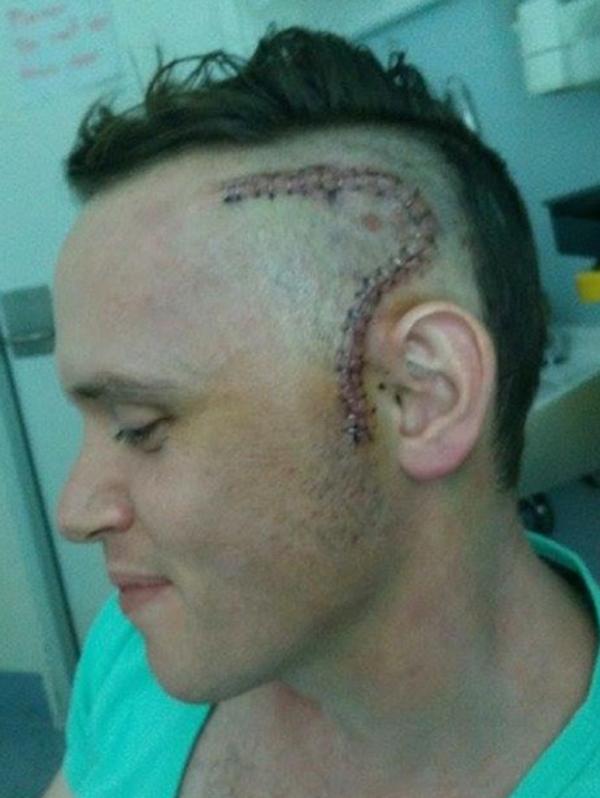Andrew Rule: Singer’s swansong becomes an anthem of cancer survival
FOR a dead man singing, Matt Hirst looked good and sounded better, so a TV talent show wanted to put the handsome young opera singer live on stage.
News
Don't miss out on the headlines from News . Followed categories will be added to My News.
FOR a dead man singing, Matt Hirst looked good and sounded better. So good that a television talent show wanted him: live on stage, the handsome young opera singer with the incurable brain tumour.
Matt reluctantly declined the offer from The Voice because he worried he had only so many performances left. Instead, he came to Melbourne to record songs to help fund the one-sided fight against brain cancer. No one listening to it would know he had to use crib notes because the hidden tumour was eating holes in his memory.
There he was in Ernie Rose’s studio in Port Melbourne, reading each line of music as he sang jazz standards he’d known for years.
Matt was 29 and had been warned he might not make 30. So when he outlived the predictions to reach the big date last month he threw a hell of a birthday party — part wake, part act of defiance.
From the day he’d been diagnosed with the tumour in November 2015, the news had been bad.
The timeline was more a deadline. It wasn’t precise — maybe 12 months to live, maybe more — but the message was clear: you won’t be around long. But he could still sing, with a little help from his friends. That’s why he put together the project to record a farewell album in Melbourne to raise funds for brain cancer research.

He arrived from Brisbane in September for the recording. No one said so but there was another reason besides the charity: the songs would be a way for his mother to hear his voice after he was gone.
That’s when this reporter met him and his mother, Jo Price, through Danny Finley, a veteran music industry insider (and friend of Matt’s aunt) who organised the studio, musicians and technicians to make the album.
That day Matt looked almost normal. He was polite and pleasant but when he lapsed into silence you could see the “thousand-yard stare” of a condemned man. He looked as if he had been to the funeral of a friend, the sad eyes reflecting the life-and-death struggle in his head.
One definition of courage is grace under pressure. Matt kept busy but stayed calm. And facing death hadn’t killed his sense of wonder or gratitude. He marvelled at the musicians who helped him, especially world-famous jazz pianist Professor Tony Gould.
It had all happened in little more than a year. The first sign was that he had trouble remembering friends’ names. “He had little moments where he’d go vague,” recalls his mother. “We put it down to stress — he was working two jobs and rehearsing as well.”
Then, one day, she took a strange call from him: he had been rehearsing and suddenly couldn’t remember the songs.
Doctors did blood tests but postponed an MRI scan because he was set to tour Germany (with the Circa company) and his memory had seemed to recover. When he got back he went for the scan — and the worried radiologist immediately told him to see a doctor “today”. When the family doctor got the scan he called Matt and said “Bring your mum” — an ominous sign for a 29-year-old patient. When they arrived the doctor said quietly: “It’s not good.”
That night they told Matt’s father, Lindsay Hirst (who is in another relationship), and younger brother Joseph, who doesn’t sing but has played gridiron for Australia. Next morning Matt insisted on working “one last shift” at his part-time job as a waiter in a Brisbane restaurant.

After his shift he went to hospital to arrange a biopsy. Four days later they got the pathology report: he had glioblastoma — a stage four tumour, the final and fatal stage.
They operated two days later. Matt asked the surgeon not to cut into the part of his brain that would wreck his speech and stop him singing, even if that heightened the risk. Ten days later he graduated as a Bachelor of Music from Griffith University, standing out from other students with his half-shaven head and its massive stitched wound in the shape of a question mark.
It was a bittersweet moment. Jo was desperately proud of her boy — and broken-hearted at the thought of losing him.
Jo Price is a quietly committed Christian. She and her friends put their faith in prayer while Matt put his in medicine, fitness and a positive outlook. With a late-stage brain tumour that’s rarely enough but Matt was determined to fight to the end. He wanted to shoot the lights out, not let the candle burn down and flicker out. Before Christmas he signed up to compete in a triathlon later this year without knowing he’d be around for it, let alone well enough.
The truth was that Matt needed a miracle. Ten days ago, he got one. His regular scan showed that the remaining tumour — the bit the surgeon could not cut out — had not grown for three months.
After more than a year of coming to terms with his mortality, Matt was left numb by the news. Then he felt guilty. Why should he survive when others don’t? Especially little children. But, after a week, the good news is sinking in. He has stepped up his triathlon training, planning to use the race as a platform to raise money and awareness for the Cure Brain Cancer Foundation.
And he has put the final touches to the album, which took a while to name. It could have been something sad and resigned like Swansong or something defiant like Shooting the Lights Out. But he settled on Mighty Steps, which now seems exactly right.
Mighty Steps is available from curebraincancer.org



